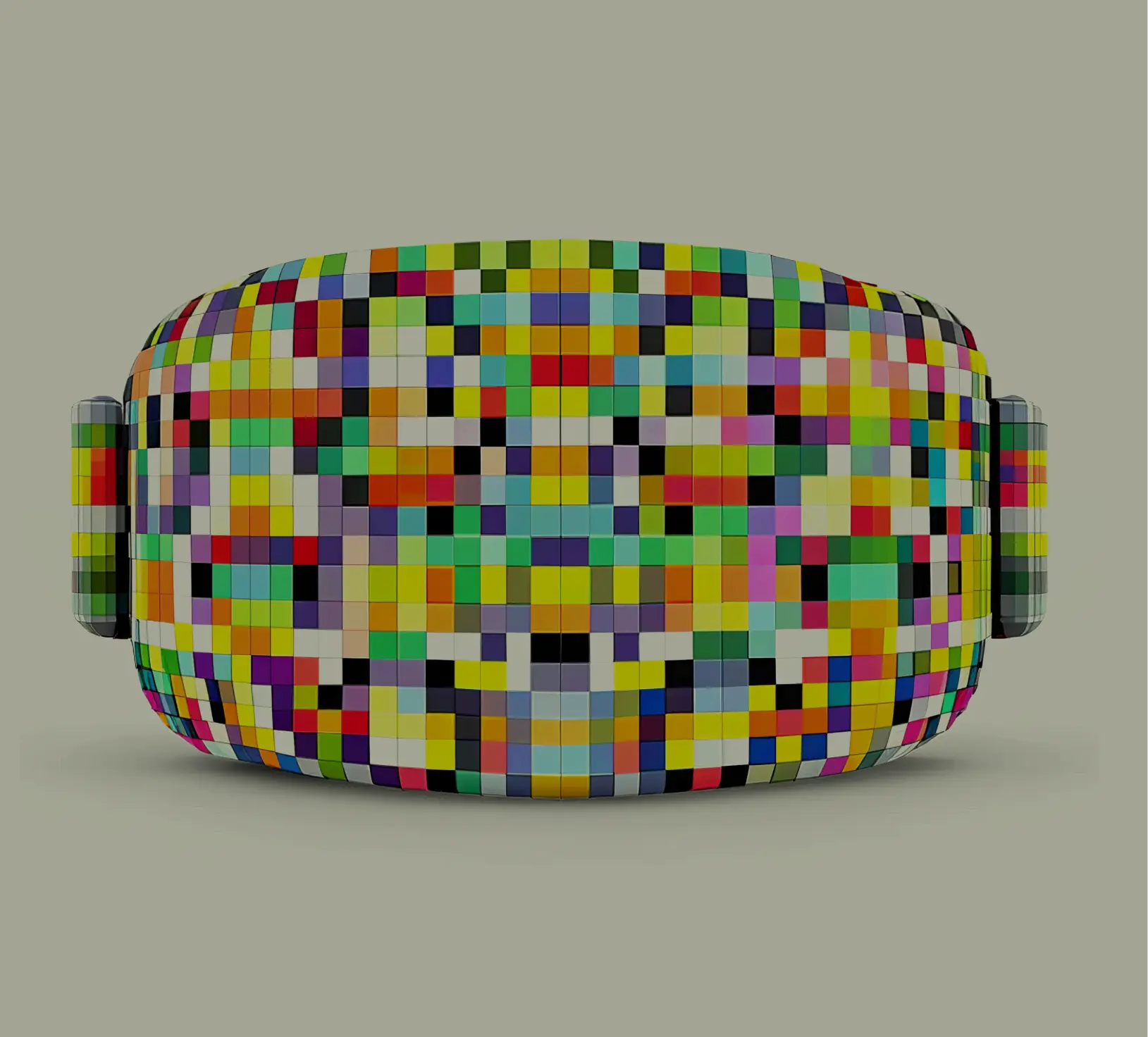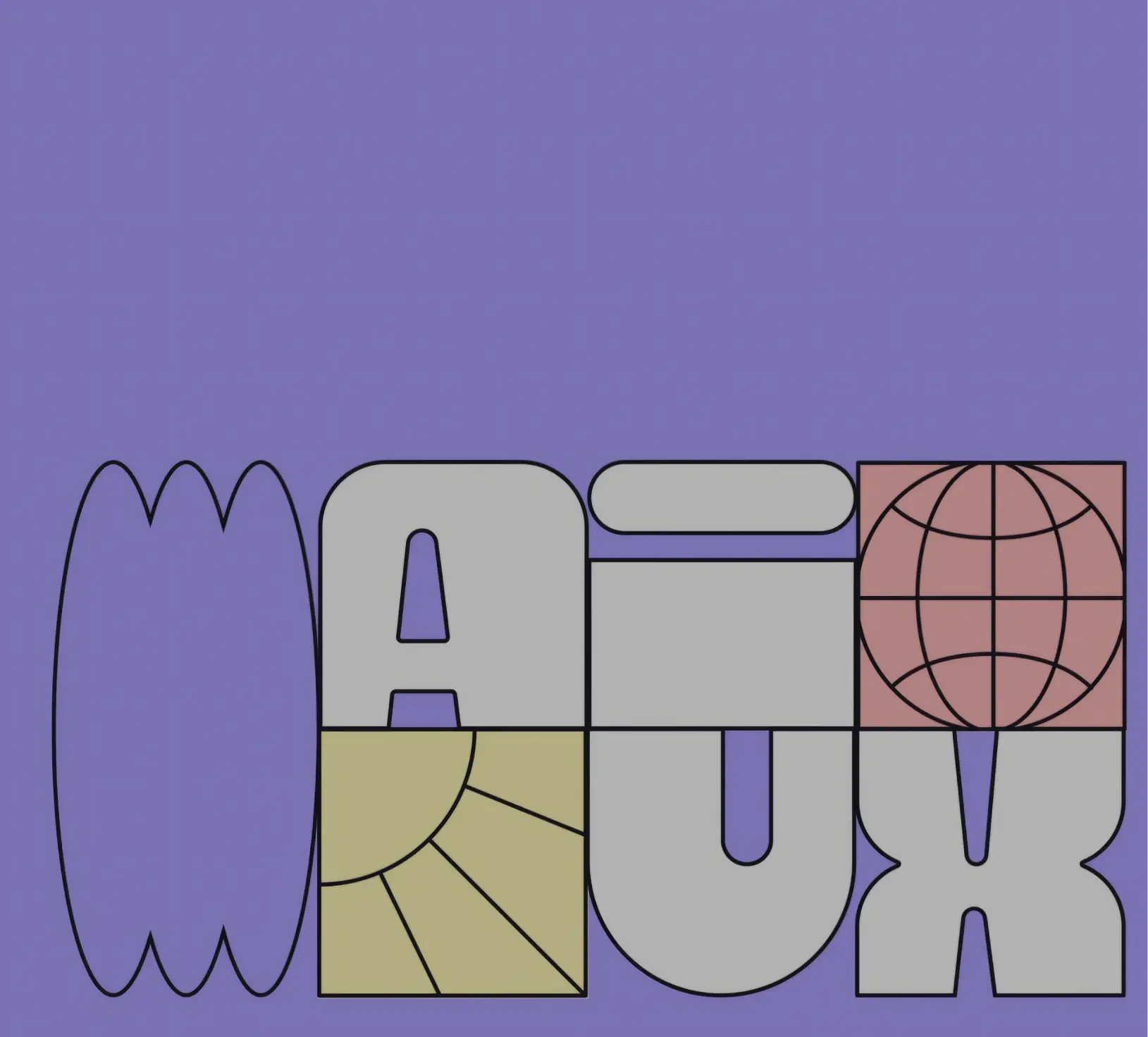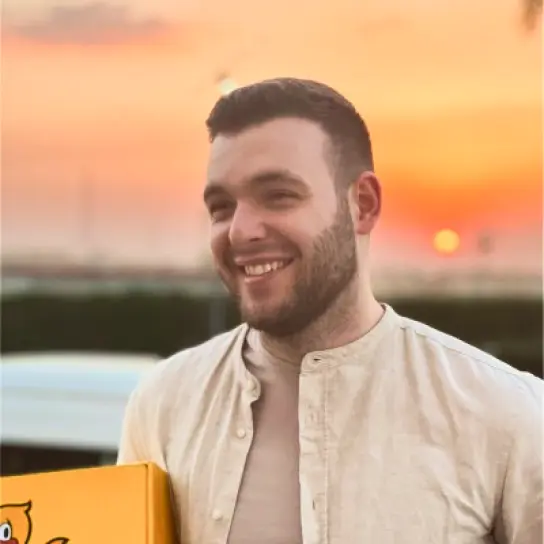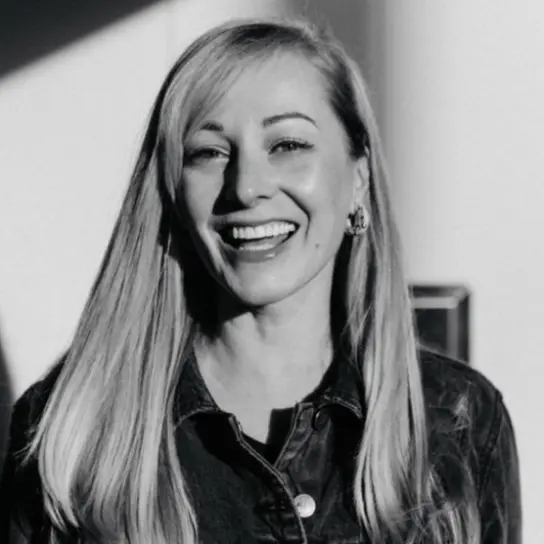AI Ruined Everything. Now What
by StratMinds
- Full TranscriptAI Ruined Everything. Now WhatChris Messina
Hello. I really hate that I'm the guy before lunch, so I guess I'm going to do my best to kind of like, I'm not going to promise to be entertaining, but I'm going to talk about some stuff that hopefully is interesting and relevant. I kind of feel like Sarah kind of did most of my talk already, so that means I can just fly through most of this, which is great. We share a similar love for typography, so we're basically the same person, just in different bodies, so that's cool.
Basically, things were going pretty well for the people of the internet up until Trump got elected. And this was sort of that record scratch moment where the music stopped and we were like, oh God. We'd been riding this euphoric experience where we had elected the first black president, and we believed that the internet was going to change the world for the better, besides notifications going off, etc. We thought that the world was going to become more open, more inclusive, more democratic, more participatory, just better all around with better graphic design.
Now, I suppose I naively believed that that was going to happen because back in the 90s, I was in high school, which dates me, I suppose. And I took it upon myself to build my high school's website. This is in the era when Bush and Beck, that's such a strange word to put together. Anyway, Nine Inch Nails, Weezer, Stone Temple Pilots, those guys, I was growing up with them, and just to give you some context for music. And this was me, this was me back in 1998. It's not no kid in New Hampshire.
So I went to a high school called Manchester High School West. This is in New Hampshire, southern New Hampshire, north of Boston. And I decided to, I mean this is before the web was really out there, build websites for all the clubs, for all my classes, for all my teachers, because I believed that this new medium was going to be the way in which students and parents and faculty and everyone else connected together, and you find out what was going on, and it would be a great way to just sort of stay in touch to get connected, that would change education.
Now, in addition to building websites for the National Honor Society or for the newspaper, I also decided to build a website for a Gay Straight Alliance, which a bunch of my friends in newspaper had started. Now, I had hosted a bunch of these microsites on the domain of the high school, of course, but the Gay Straight Alliance had not been approved, so I hosted it on my own domain. Now, back in the 90s, people in New Hampshire didn't really know anything about websites, and so this little detail was lost on that. Furthermore, people in New Hampshire at the time seemed to believe that you could catch gay by hanging out with gay people, and so they didn't want a Gay Straight Alliance website because they thought everyone would basically turn into a gay person. Just so you know, that's not how it works.
In fact, a lot of my friends were just kind of in the process of figuring themselves out, and it's like they needed a safe place to ask these questions, to figure out who they were and what they were into, regardless of body parts. Now, there was a very heavy Roman Catholic presence, and this is not meant to be about religion, I'm just giving you context, and these folks thought this was not a place where you could have these conversations. God made things one way, and that's the way it should be.
But, I decided that every website, or every club, should have a website. Every club should have the opportunity to organize, and who cares what the rules were? And so I decided to put a banner ad, if you remember what those were, in rotation on the top of my high school website, the Advertise Day. This is back when banner ads were all 460 by 60 pixels, if you guys know what I'm talking about. And it was in rotation for months. There was the art club, there was the home ec, there was whatever band, and this little Gay Straight Alliance thing going around. No one noticed, because no one used the web back then, except for me.
And then one day, it's my senior year, I'm going to graduate, or at least I'm going to, and I get called down to the principal's office. He sits me down, and he stands up, and he starts berating me, he starts yelling at me, like, how could you betray me? What happened, what did I do? Well, he pulls out this stack of paper, slams it down in front of me, says, you are announcing school policy without my permission. What apparently had happened was that the librarian with whom I had worked on this project had printed out the homepage, and the Gay Straight Alliance ad was at the top. And he thought that I was promoting this club, which didn't yet exist and wasn't yet approved, and so therefore I had gone out and essentially announced something that wasn't yet approved. And so he suspended me. And the suspension meant that I was not going to graduate in my class. And this was a big problem.
Now, what I also discovered later, is of course getting suspended for this, it seemed like a matter of overkill, was that my principal had ambitions to run for mayor. And so something like this, a Gay Straight Alliance website being out there on the internet, near his high school website, could blow up and torpedo his campaign. Now, I didn't know anything about this. I'm just a dumb kid supporting my friends. Subsequently, the ACLU and GLAD of Boston sued him and the school district to allow this Gay Straight Alliance to exist. Essentially arguing that if there were going to be any kind of religious clubs that were using school property, public property, to organize, then these other groups should have equal access under the law.
Now, eventually the ACLU and GLAD prevailed and the club was allowed to organize. My suspension was also rescinded and I was able to graduate on time. Now, this was a canon event for me. If you guys are on the Marvel Universe, you might know what that is. This was a canon event through which all the rest of my lives and timelines would have to flow in order for me to become who I am. Which basically is a person who has worked on the open social web for 20 years as a technologist, a product designer, someone who works in developer platforms and open source.
And so, hello, my name is Chris Messina. I am a generalist who invests currently in the verticalized application of AI to improve the human condition. And today, my job is to explain to you how AI has ruined everything. Now, funny enough, you should know that these slides were already done before I saw Sarah's. I am also going to talk about, even though AI has ruined everything, that there is also a better future because I too am an optimist. There is a lot that I have to get to. So essentially today I am going to speed run through a lot of these things just so that I can try to make this story all make sense.
Now, here is an outline. This is very important to sort of tell you what I am going to tell you before I tell you what I told you. Which is that one, well we have already gone through this one, but I am going to go through part two where we get into the social web and the rise of it. Agents, the birth of Chat GPT, I will explain that, the death of the social web, and then agents 2.0. So that is the overview. So we are going to go through this pretty quickly. As I said, we have already done the high school thing, first contact with the internet, great, let's move on.
So, in 2007, in January, Apple unveils the iPhone. This was the first personal computer. There had been PCs for a long time, but this was the first really personal computer because you put it in your pocket. And it did stuff for you. Later that year, in August, a bunch of us were on early social media platforms like Twitter. I wrote a blog post to propose the idea for a hashtag that would basically organize the world's conversations. Now, I didn't think it was going to be the world yet because, you know, I was still operating the scale of like high school size. So I was like, you know, what do you guys think about this? We could use a tag and then find conversations like this. Everyone, by the way, hated it at the time, and then it kind of caught on.
Furthermore, this was also the start of the Web 2.0 era. And Tim O'Reilly, one of the publishers and an open source guy, put it correctly that it was really about creating essentially what would become the first major training set for AI, even though that's not what we called it back then. It was all about data. Data, data, data. And then in 2008, Obama was elected. And in 2010, Instagram came out. Now, obviously, there's a lot of other stuff that happened, but these are sort of very important points that gets in the next part.
So in 2016, fast forward a bit, I wrote this blog post, actually in 2015, about this new phenomenon that I had observed where brands and companies were starting to message people through SMS. This has never really happened before, not in the United States anyways. This was something that was very strange and very different. This meant that brands were starting to engage in conversations, not just branded messages like on billboards that you'd see everywhere where it's one message for everybody, but actually sending you stupid things like discount codes or, you know, I think it was JetBlue sent me a notification that my plane was ready to take off or something like that. Having a conversation with a brand was a mind-bending experience. And 2015 was when I first noticed that it was happening. Here's the lightly copyedited version of the transcript, preserving all original content:
A year later, I wrote another piece where I essentially declared that 2016 was going to be the year of conversational commerce. This is when I was working at Uber. Uber was one of the first companies to really embrace a lot of these types of products and devices where you could use your voice to tell a computer what you wanted it to do. You no longer have to first convert your mind thoughts into keyboard thoughts in a string of characters to tell a computer what to do. So we're starting it closer and closer to the ways in which humans actually communicate, such that we could then use computers to then talk to brands.
At the same time, even though IFTTT had been started in 2010 or something, around this time more and more companies were opening up APIs to their backends to enable those voice assistants to be able to do things for you. The whole idea was you could talk to Alexa, ask it to do something for you. It would reach out to these APIs, make something happen, and return the result. Now, that was the one, and it sucked. And Siri still sucks. We'll see what happens at WWDC this year. But you get the idea that we're starting to get to the conversational framework for interacting with computers.
It was also this year, funny enough, there's a lot of this stuff that now exists. Actually, where's Anthony? I worked with Anthony on, I think you guys did this logo, right? Yeah. So I co-founded a company back in 2016 called Mali, which was designed to be a personal agent that will learn everything about you and then essentially allow you to learn more about what your friends were doing through conversation. The company didn't work, and I moved on. But the ideas for this next wave were starting to get planted then.
Yeah, a lot of stuff happened from 2016 to 2022. I'm totally gonna blow by that. You can imagine sort of like a VCR kind of like animation happening right now. I don't have it here. It's amazing. It's amazing, right? Isn't it so good? Yeah, you can imagine. Yeah, yeah. I just prompted your brain and you just mid-jointed it. It's so cool.
During this time period, like I mentioned before, we got Trump, so that's why I don't have any photos here. We also got COVID and we got work from home. We saw the rise of TikTok and Zoom and the metaverse and crypto were stillborn and haven't really recovered.
Like I said, fast forward into 2022. ChatGPT is born. Now, I know this because maybe you guys don't know what this is, but there's a website called Productent. I happen to spend far too much time on it. It's a great way to surf the future. I posted ChatGPT the moment it came out, and it quickly became one of the most uploaded, most popular products ever on the site. This was in November of 2022. It became product of the year. So it beat up everything else that had been launched that year. And because I had worked on Mali, I knew what this meant. I knew what LLMs in chatbots would mean for conversational software. And so while this was incredible, I was there to put the outset for this.
Now, since 2022, we've had a number of other friends, I guess, get born. Now, in our household, we actually call ChatGPT Chad because we refer to him so much. We also talk to Lex often. Claude is a new friend that just kind of comes around the block every now and then. And Po is kind of like the weird guy in the corner who's talking with his friends. I don't know if I have to tell you about that. These are all friends we have at home. We do not let meta AI in the house. If you want to go down the street and talk to meta, that's fine. Yes, I'm aware of the audience. Love you.
Fast forward. This happened at the end of 2022, so 2023 was kind of a weird year. Let's go to this year. Basically, Twitter died. So if you remember, my arc starts with Twitter. Well, then Twitter died because Elon bought it, turned it into a hellhole, whatever. We're also seeing a lot of organization of rules on the internet where different places like the EU are starting to say, well, this is what you can do and this is what you can't do with technology. So technology companies are either like, okay, we'll just do the lowest common denominator or we'll create a bunch of different app stores that have different rules all over the place. So we're very quickly going to move into a world where it's very hard to have coherence. We're basically in a process of decoherence.
The other thing that's going on, and I guess is happening this year thanks to LLMs and these technologies, was we're starting to get into, I guess what I would consider to be kind of an internet native pattern language that allows people to use, again, common phrases, descriptions, prompts to say, I want something. And then the computer responds by commoditizing everything that's ever been published or created on the internet and can give it to you.
So this is something called V0 by Vercell. Vercell is basically a web hosting kind of application service. So you can tell it what kind of information you want and it will just generate it for you instantly. There's a whole community just like MidJourney where people are sharing these web components that you can launch as a website.
So where does this go, right? This is just the beginning. Well, we're starting to return back to the V1 promise of those agents that launched back in 2016, right? So Siri, Alexa, Google Assistant, they all sucked. Well, they're about to get a lot better. We had the right idea. We had the right interface. It just didn't work. And so now, several years under our belts, we can return to this period, not just because we know some of the patterns and the ways in which humans interact with these things, but we're starting to get to the point where these agents can actually write code for themselves and solve problems in the moment. Whereas before it was all based on rules and it was very brittle. So you ask Alexa to do something, it's like, I'm sorry, I don't know how to do that. Now you ask Alexa and it can write code for itself while it's in free fall. And, you know, whatever. If you guys don't get some reference, I feel very lost. Okay, thank you.
Now, this is a little bit more contemporary, so this is a little younger. But you can imagine just as we had physical hardware you have to plug into the wall to access voice assistants, now we're untethering those same kind of conceptual products and putting them onto a pin that overheats or a rather base product or this other lapel that you wear and records everything all the time. So it's not even that to sort of like say, you know, hey, Alexa, do something for me. They're just constantly listening, which will eventually get to the place where they become anticipatory. They hear the context of what you're doing in your day-to-day life and they think, oh, I could solve this for you. Let me book something for you. Let me look something up for you. That's definitely where we're going next.
However, we are also in this very strange moment with synthetic media. Now synthetic media is something we've been talking about for years, but it's getting to the point where not only is it real time, but it's becoming very plausible. So what are we seeing here? We're seeing a man who essentially has a video recorder on himself and he's talking to the camera and in real time his face is being swapped out. Now before you'd see artifacts, you'd see different ways in which this image degrades, but he's actually, I don't know if he's done it yet, he's going to start eating soon. Yeah, watch this. So you can't even tell the difference.
So we're going to be living in a world where this type of synthetic media is the norm, is the default, is what we're going to be interacting with, and that creates a whole host of problems for us because culturally we are more polarized than perhaps we've been in generations. And in fact, deep cultural visions that were caused by generations of untreated trauma and conflict are being amplified by these technologies that we're building. So essentially you have all these things that we haven't actually addressed for generations or millennia, inter-family conflicts, intercultural conflicts, but we kind of let it go because we had geography to keep us separate, as the offspring said to me, myself and Gavin, right?
Well we no longer can keep ourselves separated, and so we have to address those things that undermine all these technologies that we're building to bring us closer together. So when I make the statement that AI has ruined everything, what I really mean is that we're only going to get AI that's as good as the best humans and the best human relationships, because in far too many examples we are still horrible, horrible. We have a long way to go.
So my thesis about that better future is that we have to improve humans to improve AI, which will in turn gradually improve humanity, right? Okay. Now how do we do that? Well I've come to think of myself as a kind of technology, something that I can study and something that I can improve. And furthermore, each of us has an opportunity and an obligation to invest in the development of the technology of ourselves. And I think we can do this by targeting a couple different contexts. So obviously one of those is the self and the relationship to the self. How do you take care of yourself? How do you think of yourself? How do you know yourself? How do you yourself show up in different contexts? How do you speak up for yourself? And then how do you show up in the relationships that you have with other human beings, other persons, other friends, other enemies? And then how do we relate to our machines? Here's the lightly copyedited version of the transcript, preserving all original content:
Those things that are automated around us, that interrupt us, also tell us when our flight is going to leave, so we can be there. As technology and AI designers, I think we can augment humanity by focusing on some of these classes of opportunities. One is to promote prosocial behaviors. Now I'm not going to get too detailed into these things now because I've got lunch, but I'll go through this quickly.
Prosocial behaviors, things like self-awareness, mindfulness, introspection, embodiment. How am I feeling right now? Like in my body, not just how do I think I'm feeling? These thoughts aren't facts. Are they facts? Sometimes they can be facts. Facts aren't feelings. Feelings are facts. I'm getting un-conceived. Empathy. Sarah talked about this one. This one I'm probably sure is going to be the theme for the next 20 years because we've not been very good at it for the last 200 years. And obviously prioritizing richer and more meaningful interactions between humans. Maybe augmented by technology, maybe not. Maybe we make a choice. Is technology invited into this room or into this container? Or do we want to put it in a pouch when we go to high school or when we're sitting at the dinner table? There's different ways we can think about that.
Okay, so one more idea. As designers, building products is but one way to support these types of changes. But to scale this change, and this is really what I've been thinking most about, as the guy who came up with the idea for the hashtag, and I'm sure as you have all been creating products that have touched millions of people around the world, you have to think at one point, if you could put a little spin on the baseball a little differently, what are the outcomes that might have been different based on what you built? It's not like people started social media and be like, oh, screw democracy. That wasn't the thought, I don't think. Maybe, I don't know. But ultimately, the things that we create are reality.
Since I was there at the beginning of this first technological wave, designing social products, and as someone who is a designer myself, I think a lot about how my cultural context, my upbringing, my experience in high school, my principle, you know, the chain for trying to support the community, caused me to behave in certain ways. It just seems to reason that our culture affects us. And as designers, just like artists, we like to write ourselves into the products that we make, into the things that we externalize from ourselves.
Therefore, products reflect the designer's cultural context. And through our design, through our choices, choices that we make, whether we launch the like button or the retweet button, or put the hashtag out there and prevent people from using it, or encourage them to use it, this has the downstream consequence of affecting users' behaviors and what they think they should do. You guys all know that defaults matter. But our culture also informs the things that we think should be the defaults. And so this is why we have to really think about how our culture affects users' behaviors.
This is why self-awareness and self-knowledge is so important. What are the things that we're audaciously putting into our products that we're not even aware of? Because as our products become more widely adopted, you know, like Facebook and Twitter before, they can shift culture as a whole by changing individual users' behaviors. It's a collective problem. So that's why it has to start with each one of us.
If I were to go back, like, I'm lucky to this, or if it was like one of the other Marvel universe things where you go back and sort of like accept yourself. Anyways, had I known back then the things that I know now, which of course is not possible, I probably would have thought to invest much more in the technology of myself, myself as being part of this project of creating social media. I am social media, as which one of you are social media. So the ability for me to know myself, to be curious, to be able to label the things that I'm experiencing, and then to share them with other people so I can learn and share back what other people are experiencing with me, and to follow my intuition, I think is how we get to set about working on the technology of better humans sooner.
Because this is the only path that I've been able to come up with so far in which I can imagine that we prevent AI, which again is fundamentally about us and the way we see the world, from ruining everything. I hope to join you. Thank you.
[Applause]
We have lunch, so we're going to go, but before we do that, thank you by the way. I had a lot of questions also myself. So we're going to actually ask Dave to come up for one second from MetaLab and also Noah from OCCAPA. Well the reason is that we have, as I mentioned, doing this for the first time, doing this sort of unique special group together.
Join Swell
At StratMinds, we stand by the conviction that the winners of the AI race will be determined by great UX.
As we push the boundaries of what's possible with AI, we're laser-focused on thoughtfully designing solutions that blend right into the real world and people's daily lives - solutions that genuinely benefit humans in meaningful ways.
Builders
Builders, founders, and product leaders actively creating new AI products and solutions, with a deep focus on user empathy.
Leaders
UX leaders and experts - designers, researchers, engineers - working on AI projects and shaping exceptional AI experiences.
Investors
Investors and VC firms at the forefront of AI.
AI × UX
Summit by:
StratMinds
Who is Speaking?
We've brought together a unique group of speakers, including AI builders, UX and product leaders, and forward-thinking investors.
Portal AI
Ride Home AI fund
Google Gemini
Metalab
Slang AI
Tripp
& Redcoat AI
Stanford University
Google DeepMind
Grammy Award winner
Portal AI
Ride Home AI fund
Google Gemini
Metalab
Slang AI
Tripp
& Redcoat AI
Stanford University
Google DeepMind
Grammy Award winner
Google Empathy Lab Founder
Blossom
Lazarev.
Chroma
Resilient Moment
Metalab Ventures
of STRATMINDS
Google Empathy Lab Founder
Blossom
Lazarev.
Chroma
Resilient Moment
Metalab Ventures
of STRATMINDS





























